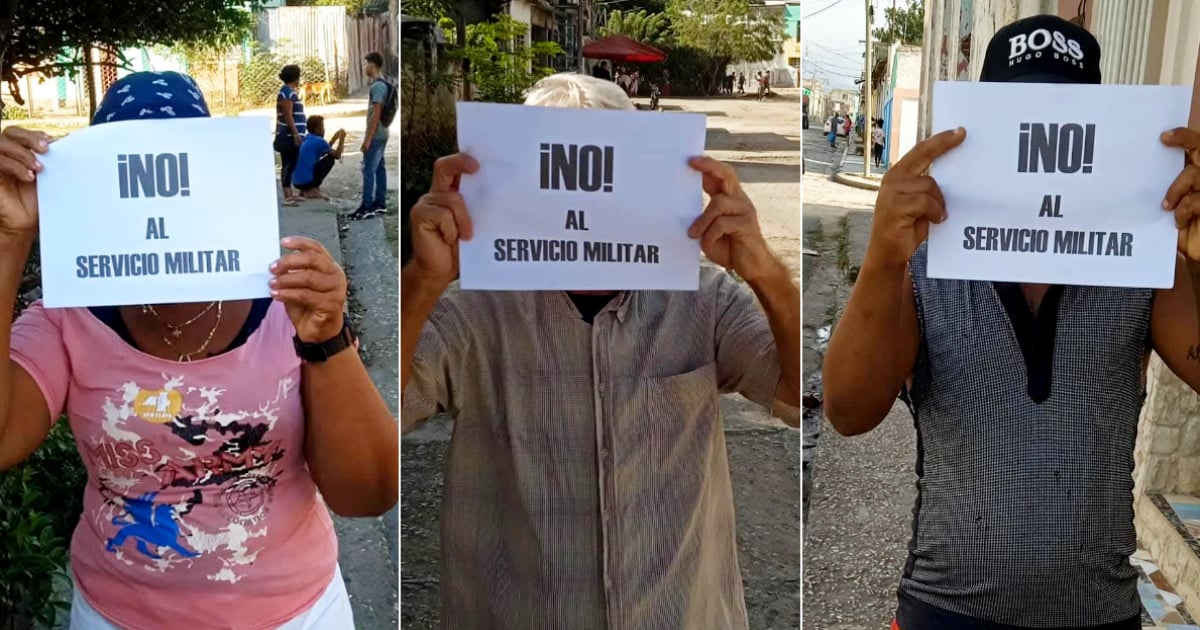Amidst sorrow and outrage following the disappearance of nine young soldiers and four military personnel in an ammunition depot in Holguín province, the movement against Mandatory Military Service (MMS) has gained new traction in Cuba. This campaign, driven by activists and groups such as the Republican Youth Impact movement, calls for the abolition of MMS, which many view as oppressive and perilous for Cuban youth.
The explosions at the Holguín depot and the lack of transparency from authorities have fueled citizens' fears that the missing may tragically include conscripts whose deaths the Cuban regime seeks to conceal. This heightened tension and uncertainty have reignited opposition among parents and youths against the enforced military service, with many joining the campaign both online and on the streets.
Protests Erupt Amidst Growing Dissent
Protests have taken place across provinces like Holguín, Santiago de Cuba, Matanzas, and Artemisa, where scores of young people have demonstrated with banners and chants like "Our youth deserve to live, not die!" and "No to Mandatory Military Service." Despite heavy police presence, these protests reveal increasing public dissatisfaction, particularly among young people and their families.
Ramón Zamora Rodríguez, national spokesperson for the Cuban Republican Party, praised the bravery of those involved in the protests, labeling them as "acts of courage and civic commitment." He emphasized that this tragedy highlights a deeper issue: MMS is not seen as a civic training tool but rather as a state control mechanism endangering young Cubans' lives and futures.
"It's unacceptable that we continue losing lives due to outdated and inhumane policies. We demand the end of mandatory military service and the implementation of policies that prioritize education, development, and freedom for our youth," stated a spokesperson for the Republican Youth Impact movement.
Social Media Reactions and Calls for International Support
The campaign has resonated on platforms like Facebook among activists and ordinary citizens. Independent journalist Yosmany Mayeta Labrada has criticized the dangerous conditions and risks tied to MMS, urging authorities to reconsider this system. In a Facebook post, Mayeta noted that "hundreds of young people have died over the years" fulfilling military service.
Images shared online depict the anger and resolve of demonstrators determined to highlight an issue they see as a violation of youth rights. The movement also appeals to the international community and human rights organizations for support.
The tragic incident in Holguín has acted as a catalyst for a long-suppressed debate in Cuban society. With backing from citizens, activists, and organizations like the Republican Youth Impact, the "No to Mandatory Military Service" campaign aims to end what protesters claim has cost too many lives and stifled opportunities for young Cubans.
Widespread Opposition to Mandatory Military Service in Cuba
Mandatory Military Service in Cuba has been contentious for decades, with rising public opposition in recent years. This system, affecting mainly those aged 16 to 28, draws criticism for the vulnerability and risks it imposes on conscripts.
Various organizations and public figures have condemned the dangers and abuses faced by youths during their service. In August 2024, Anisleydis Suria, whose son was jailed for refusing to serve, openly opposed MMS, highlighting the harsh conditions recruits endure.
Furthermore, in January 2024, it was reported that young Cuban women pursuing a Journalism degree must first complete a year of Mandatory Military Service, as stated by official media. This requirement has raised concerns among many young women, fearing it could hinder their access to higher education and impact their life plans.
Recent legislation, Decree 103/2024, increased penalties for failing to register or attend military service, with fines ranging from 2,500 to 7,000 Cuban pesos. Parents of minors are held accountable for their children's infractions, seen as a government reaction to mounting social discontent over MMS.
Despite the complaints, the Cuban regime insists that the service is not truly "mandatory." In May 2022, during a session of the United Nations Committee on the Rights of the Child in Geneva, Yisel González García, a Cuban Foreign Ministry official, claimed that military service in the island is voluntary.
According to her, "citizens of both sexes who wish to do so may voluntarily join the Military Service." However, this assertion faces widespread skepticism as Cuba's National Defense Law mandates service for males. Article 67 specifies that "males from January of the year they turn seventeen until December of the year they turn twenty-eight must complete two years of Active Military Service."
Military registration is compulsory from age 16, and failing to comply can lead to legal penalties. Meanwhile, the regime defends MMS as part of the "national defense preparation" against perceived "external threats." Yet, this narrative fails to convince broad segments of the population, especially young people, who continue to demand alternatives that prioritize their development, education, and freedom.
Frequently Asked Questions about Mandatory Military Service in Cuba
Why is there opposition to Mandatory Military Service in Cuba?
Opposition stems from the belief that Mandatory Military Service imposes unnecessary risks and restricts opportunities for Cuban youth, with many viewing it as a state control mechanism rather than a civic duty.
What sparked the recent protests against Mandatory Military Service?
The protests were fueled by the tragic disappearance of young soldiers in Holguín and the perceived lack of transparency from authorities, which intensified fears and opposition among citizens.
How has the Cuban government responded to the opposition?
The government has increased penalties for non-compliance with military service requirements and continues to insist that the service is voluntary, despite evidence suggesting otherwise.
